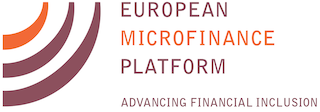 Silke Mufflemann of Frankfurt School of Finance and Management described the common differences between women-owned micro-, small and medium-sized enterprises (MSMEs) and those owned by men during a session at this month’s European Microfinance Week. On average, women owners are more cautious regarding business decisions and want more information before accepting a loan. In lower-income countries, women often have had less access to education and are less confident in their financial and business management skills. They also tend to have more limited social and business networks from which to draw information and other resources. For all these reasons, Ms Mufflemann argues, it is key that financial services providers (FSPs) connect women with non-financial support services.
Silke Mufflemann of Frankfurt School of Finance and Management described the common differences between women-owned micro-, small and medium-sized enterprises (MSMEs) and those owned by men during a session at this month’s European Microfinance Week. On average, women owners are more cautious regarding business decisions and want more information before accepting a loan. In lower-income countries, women often have had less access to education and are less confident in their financial and business management skills. They also tend to have more limited social and business networks from which to draw information and other resources. For all these reasons, Ms Mufflemann argues, it is key that financial services providers (FSPs) connect women with non-financial support services.
Bettina Wittlinger, also from the Frankfurt School, discussed how to determine whether a FSP is “gender-smart.” Among the factors is product development. Do the FSP’s products respond to women’s needs? Women constitute a big group; should the FSP offer several products to serve various segments of the group? Does the FSP have staff buy-in to prioritize serving women? Is there a person who can be the primary champion to push gender considerations?
Perhaps the FSP needs a team within the institution that specifically serves women. Has it trained staff in what needs women have that are different than men’s needs? Since women often repay loans more reliably than men and switch FSPs less often, Ms Wittlinger argues that FSPs should be measuring these data. Does the FSP collect data by sex and longevity of the customer relationship?
Caroline Lentz of the European Microfinance Network (EMN) discussed Microstart, an FSP in Belgium that performed an audit to see how gender-smart it was. In particular, leadership wanted to focus on how staff treated women, including by countering implicit bias. With the benefit of the audit and Microstart peer visits to other FSPs in Europe, it developed a data-tracking system that it is using to improve its service to women.
Katarzyna Hanula-Bobbit from the 130-member Microfinance Centre (MFC) discussed the work of the Bulgarian FSP Siscredit, which provides mentoring to women business-owners. She noted that women in Bulgaria are relatively open to starting businesses because the government supplies childcare and other benefits regardless of whether citizens have salaried jobs. In general, she finds, women’s enterprises tend to be smaller in scale and less capital-intensive than men’s firms. Thus they may have less potential to get very large.
Willemien Libois, another representative of Frankfurt School, described what happened when the Kenyan government decreed that 30 percent of its procurement would be from women-owned enterprises. This pushed FSPs to serve women with tailored products, contributing to women strengthening their businesses and securing lucrative government contracts.
In closing, Ms Wittlinger described the Social Inclusive Finance Technical Assistance (SIFTA) program, which is managed by the European Investment Bank and offers European social enterprises technical assistance from EMN, Frankfurt School and MFC. This assistance can include site visits and impact assessments, for example.
During the audience participation portion of the session, attendees mentioned various concrete ways FSPs can ease women’s access to finance, such as by adjusting branch hours, lowering collateral requirements and making it clear that mothers may bring children to FSP appointments.
This feature is part of a sponsored series on European Microfinance Week, which took place in Luxembourg and online from November 16 through November 18. MicroCapital has been engaged to report on the conference each year since 2012.
Additional Resources
European Microfinance Week 2022
https://emw2022.eu
MicroCapital coverage of European Microfinance Week since 2012, including the European Microfinance Award
https://www.microcapital.org/category/european-microfinance-week/
Similar Posts:
- SPECIAL REPORT: Financial Inclusion for Women Requires Engaging All Levels of the Microfinance Institution
- SPECIAL REPORT: European Microfinance Week 2023 Opens With Action Group Meetings, Including Investors Sharing Strategies for Measuring Social Performance #EMW2023
- MICROFINANCE PAPER WRAP-UP: “Financial Inclusion That Works for Women,” by Sam Mendelson, Published by e-MFP
- SPECIAL REPORT: Financial Inclusion of Forcibly Displaced Persons (FDPs), Host Communities Results in Competitive PAR Ratios #EMW2023
- SPECIAL REPORT: e-MFP Green Inclusive and Climate Smart Finance Action Group Focuses on Capacity Building
